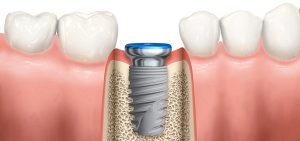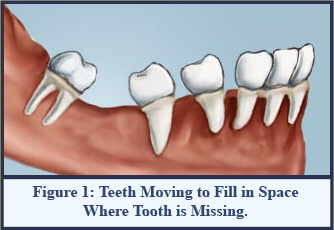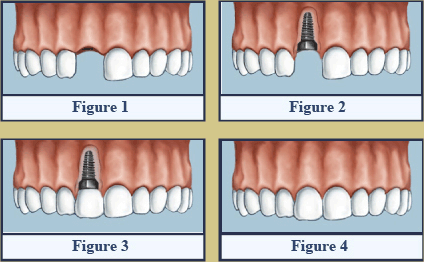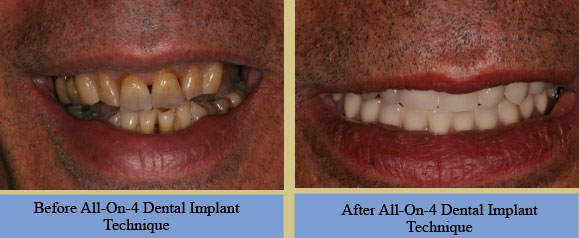



We are thrilled to be one of the few practices in the San Antonio, Texas area offering this amazing new solution for those living with lost teeth. Dr. Schmitz has been surgically placing dental implants for over 22 years and has never seen such a dramatic leap forward in technology.
The process of dental implant surgery is often associated with multiple surgeries with months of recovery time between each part of the treatment. The entire process usually takes 12 to 18 months. However, an entirely new approach has now been perfected that allows us to complete the restoration of an entire jaw in a single morning appointment. In fact, this miraculous procedure was termed Teeth-In-A-Day. Treatment for those missing from a single tooth to just a few teeth can take even less time.
It all begins with an initial consultation in which Dr. Schmitz explains treatment options and verifies the jaw bone is ready to support dental implants.
We take a CT scan of the patient’s jaw this can be done in our office immediately! With this scan, we are able to perform virtual surgery on a computer that allows us to determine the optimum position for each dental implant in any and all available bone. This avoids the lengthy, open-incision approach that is traditionally used. During this time, beautiful custom replacement teeth are designed and crafted that will attach to the dental implants. This entire planning and fabrication process takes about four to six weeks.
When the final denture is ready, the patient comes in for a single appointment in which all the implants and replacement teeth are placed. Unlike previous dental implants that required months of recovery before they could support stress, this approach utilizes Immediate Function implants from Nobel Biocare. Because no incisions are required, there is virtually no down time. Many patients eat a light meal the same evening. Near full function is achieved in just a few days.
Select from the links below to view information on that treatment:
More than 30 million Americans are missing all of their teeth in one or both jaws. By the age of 74, 76% of adults have lost all of their permanent teeth. 69% of adults ages 35 to 44 have lost at least one permanent tooth to an accident, gum disease, a failed root canal or tooth decay.
Although you have a number of restorative options for the treatment of missing teeth, none have proven to be as functionally effective and durable as dental implants. In many cases, dental implants may be the only logical choice for the restoration of all necessary functionality of the teeth and supporting structures.
Dental implants are precision devices used to replace the root of a missing tooth. These titanium screws or cylinders are anchored into the jawbone where it can support a single tooth crown, a multi-tooth bridge, or stabilize a removable partial or full denture.
Teeth are lost due to:
You will feel self-conscious when you smile or talk. Tooth loss will have a negative effect on your eating habits, which could lead to health problems like malnutrition.
You will also experience bone loss if you have missing teeth. Bone loss occurs because when a tooth is missing, the bone may erode and weaken since there is no tooth supporting the bone.
Your teeth will naturally try to close the gap of your missing tooth which will cause spacing between your teeth (See Figure 1).

In most cases, dental implants are stronger and more durable than bridges and dentures. Single implants can serve to support crowns replacing a single missing tooth. Implants can also support a dental bridge for replacement of multiple missing teeth. Patients with full dentures often struggle with instability and discomfort which limits their function. Implants placed to help stabilize a denture can decrease pain and allow patients to chew without difficulty.
The importance of this procedure is to create a functional and structural connection between the bone and the dental implant. The process is Osseointegration. Osseointegration is the fusing of the dental implant’s body to bone.

Dental Implants are a proven dental solution. Historically, dental implants placement has been around for over 30 years. Studies have consistently shown success rates above 95%. Dr. Schmitz’s success rate has proven to be even higher than 95%.
Because dental implants bond to bone, crowns attached to dental implants look and act similar to natural teeth. When brushing and flossing dental implants use the same techniques used on natural teeth.
Dr. Schmitz lectures and trains Doctors from all over the country on how to successfully and predictably perform the All-On-4 technique for placing dental implants.
The procedure created by Nobel Biocare is an Immediate Function procedure that is effective for denture wearers or those who need a full restoration (upper and/or lower). In one procedure, patients who qualify will receive four to six implants and a complete set of replacement teeth, without bone grafts. A consultation is necessary to see if you are a candidate for this amazing procedure.

NobelBiocare is one of the leaders in providing the All-On-4 procedure. Unlike other procedures that use six, eight or more implants which often include bone grafting, NobelBiocare uses only four implants without bone grafts, and has a very high success right compared to traditional methods. The All-On-4 Technique, developed in Europe, is CE and FDA approved.

An example of the magnificent work done using the technique. Dr. Schmitz felt the All-On-4 Technique was the best option for this patient which gave him a new and beautiful smile.
